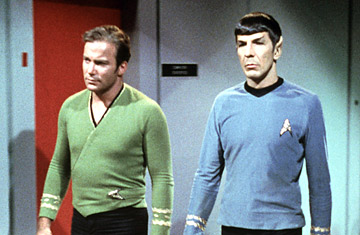
William Shatner and Leonard Nimoy in Star Trek
(2 of 3)
The men's uniforms — Kirk's taupe top and Spock's blue one, in coordinated earth and sky colors — are subtler versions of the Jets' and Sharks' T-shit garb in West Side Story. When they keep them on, that is: Shatner and Takei go topless in early episodes. We also appreciatively note the female officers' cling-on miniskirt suits, and the beehive 'do, redolent of Baltimore 1962, worn by Grace Lee Whitney as Yeoman (I mean yo, woman!) Rand. First-season guest stars like Jill Ireland, Madlyn Rhue and Joan Collins got the soft-focus treatment lavished on Doris Day in films of the period. The show wanted its actors looking feature-film attractive, in the last Hollywood years when that sort of glamour was mandatory.
The lead actors fit seamlessly into the retro-futuristic design. Shatner's face, even when it gets furrowed in thought, is perfectly smooth, as if his skin were some space-age polymer. Nimoy's Spock is more a hodgepodge: a Moe Howard haircut, Stephen Colbert ears and purple eye shadow under diagonal brows that Joan Crawford would have died for. In a famous first-season episode, "The City on the Edge of Forever," the two men are transported back to Manhattan 1930, and Kirk lamely explains Spock's look to a skeptical stranger by saying, "He caught his head in a mechanical rice picker."
That jape allows for the thesis that the whole series was deadpan comedy. I doubt it. The banter between the all-American Kirk and the half-human-half-Vulcan Spock does have the teasing tone of Mel Gibson's and Danny Glover's in the Lethal Weapon movies (and with the same racial tinge), but the episodes typically teach a moral lesson in the guise of kid-friendly science fiction. That's why the stars issue their line readings in the sensible baritones of TV news anchors and FM radio announcers. Their job is to speak fantastical sentences with a reassuring plausibility, keeping faithful to the rules of melodrama, to the laws of emotional gravity.
An anti-Trekkie would say that the cheesiness of the show was part of its appeal — rather, the purity of the cheesiness. But that is to undervalue Star Trek's medium-high quality and flights of speculative drama.